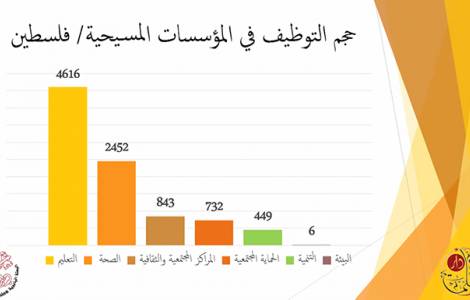
Jerusalem (Agenzia Fides) - A study promoted and funded by the Pontifical Mission to Jerusalem and by the Dar Al Kalima University College of Arts and Culture (academic center founded in Bethlehem by the Lutheran pastor and theologian Mitri Raheb) says, data in hand, that Christian institutions working in Palestine represent the third largest "employer" for the local population, immediately after the Palestinian National Authority and the United Nations Agency for the Support of Palestinian Refugees in the Middle East. The research data was presented on Tuesday, March 16 during an online press conference, the summary report of which was also relaunched by the Jordanian website abouna.org.
The survey, aimed at documenting the role of institutions linked to the Church and Christian communities present in Palestine and their impact on local society, was developed in five months under the coordination of researcher George Akroush, and represents a kind of updated mapping of church institutions working in the Palestinian social context - West Bank, East Jerusalem and Gaza Strip. The results of the research attest to the significant impact of Christian institutions within the Palestinian community, despite the migratory processes which have recorded, over the past decades, a constant decrease in the Christian component within the population of the Palestinian territories.
The study monitored the contribution made to the development of the Palestinian social fabric by 296 Christian institutions present and working in Jerusalem, the West Bank and the Gaza Strip, namely 93 schools, universities and vocational training centers, 19 health structures, 47 institutions social protection, 77 cultural centers and territorial tourism promotion, 38 centers for young people and the scout movement, an environmental protection center and 21 local and international development agencies. The study confirmed that Christian social and charitable works exerise their service for the benefit of hundreds of thousands of Palestinians, regardless of their political and religious affiliations. The network of works and institutions promoted by Church and Christian communities in Palestine currently employs more than 9 thousand people, including 5017 Christians and 4081 Muslims, far exceeding the number of people employed by companies, constituting de facto the third largest employer in terms of jobs and salaries distributed among the local population, after the administrations of the Palestinian National Authority and the UN ad hoc agency responsible for the support of Palestinian refugees, also at an employment level.
The survey also estimated at 416 million USD the total economic resources distributed each year by Christian institutions and works of ecclesial origin active in vital sectors such as health care, education, social services, professional training. Works which, in one way or another, benefit at least 37% of the Palestinian population in the West Bank, Gaza Strip and East Jerusalem, and which also indirectly have positive effects on the social life of the entire population of Palestine.
For example, the survey shows that, out of a total of six specialized hospital structures operating in East Jerusalem, four depend on institutions and ecclesial communities and provide specialized treatments - oncology, pediatrics, ophthalmology, etc. - to more than 330,000 patients each year.
During the presentation conference, both Pastor Mitri Raheb and Dr. Joseph Hazboun, Regional Director of the Pontifical Mission, underlined the important role played for decades by Christian-inspired institutions at the service of all the Palestinian people, without discrimination.
In June 2019, as reported by Agenzia Fides (see Fides, 21/6/2019), the "Pontifical Mission" in the Holy Land celebrated its 70 years of activity. The organization, founded in 1949 at the instigation of Venerable Pope Pius XII with the primary aim of helping Palestinian refugees after the creation of the State of Israel, today offers itself as an instrument of aid aimed at "the needy in the Holy Land, Palestinians and Israelis, of all ages and all faiths".
The tragic condition of many Palestinians after the proclamation of the State of Israel had aroused in Venerable Pope Pius XII the desire to create a specific ecclesial body to help them. This is why the Catholic Near East Welfare Association, an agency under the jurisdiction of the Congregation for Eastern Churches, was tasked with creating an organization that offered support to children, families, the sick, the elderly and the exiles. Hundreds of thousands of Palestinians were forced to leave their homeland and take refuge in the part of the territory under the control of the then Transjordan or Egypt. On June 18, 1949, Cardinal Eugène Tisserant, Secretary of the Congregation for the Oriental Churches, published the document which sanctioned the birth of the Pontifical Mission.
Initially, the Mission focused on assisting displaced persons and refugees. After the birth of the United Nations High Commissioner for Refugees, it adapted its programs to collaborate with this institution to improve the living conditions of Palestinians in refugee camps. (GV) (Agenzia Fides, 17/3/2021)